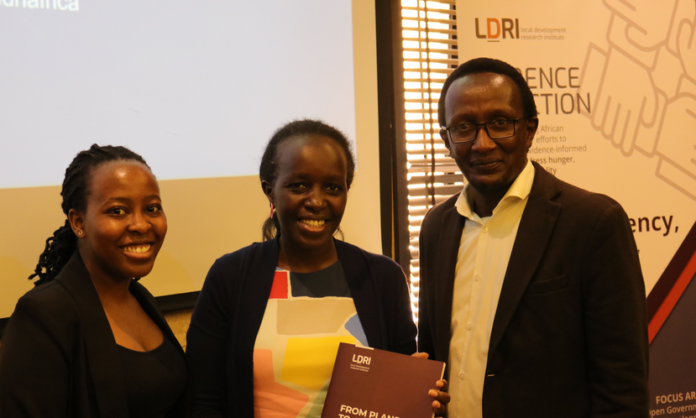By Winnie Kamau
Nairobi, Kenya: A report dubbed, From Plans to Actions: How CSOs Support the OGP Process in Kenya was recently launched by Local Development Research Institute (LDRI).
During the launch of the report the Ombudsman urged Government entities to join the Open Government Partnership (OGP) platform in order to serve the citizens better.
Speaking during the event, Commissioner Lucy Ndung’u In Charge of Access to Information at the Commission of Administrative Justice (the Ombudsman) said, “As we launch this report I hope that other public sector institutions will see and cease the opportunity to join OGP and collaborate with others so that we can move together and achieve more in the development of this country”
The report authored by Jessica Musila of LDRI looks into the journey of CSO’s from 1990, civil society has been part and parcel of Kenya’s reform journey which culminated in the promulgation of the Constitution of Kenya 2010 and gives a raft of recommendations to enhance the Partnership in the country.

The Open Government Partnership(OGP) was launched in early 2011 globally with 8 governments and 9 civil society Leaders, Kenya joined OGP at the tail end of 2011. The Partnership was founded on the principles of Transparency, Accountability and Inclusion for any government that is open and is responsive to its citizens.
OGP is a Multistakeholder inclusive organization which brings both Government and Civil Society Organizations (CSOs) where they work together. Currently OGP has grown to 78 Governments and 76 Local Governments with a host of Civil Society Organizations joining with thousands of Commitments developed to advance Open Governments.
Currently Kenya sits at the Governing Board of OGP represented by Kenya’s Deputy President, William Samoei Ruto alongside Stephanie Muchai of Hivos representing the CSO Communities for the next 3 years.
At the Global level OGP, is governed by 11 Governments and 11 Civil Society Organizations.
A 2-year Action plan is developed which is very concise around Government and what the stakeholders would want achieved.
“At the end of the 2 years there’s an Independent Reporting Mechanism (IRM) that assesses how the partnership has done and what they have achieved, if more players have been engaged in the course of implementing the plan” said Maureen Kariuki, Senior Regional Coordinator of OGP Africa and the Middle East.
Maureen adds “Peer review is part of the learning mechanisms and as the partners get to share their own experiences both nationally and globally as the partnership is more action oriented allowing for pragmatic and candid conversations in the room between the stakeholders both in Government and CSOs allowing for ambitious commitments in their plans”.
OGP looks at how governments are using the OGP reports to address societal challenges and how other countries can learn from the experiences of others.
Kenya is currently in the process of developing its 4th National Action Plan through the Multi Stakeholder forum where there’s shared responsibility to see the commitments work. The lead implementers are Government while the co-implementers are CSOs through their resources or their expertise and monitoring how implementation is done.
Collective Actions globally as a race to the top include Inclusion, Anti-Corruption, Beneficial ownership, Transparency, Open Contracting, Open Justice, Civic Space and Public Service Delivery and this is context specific and depends on prioritization of the country.
OGP has the Open Response call to action which includes improving disclosure to information, facilitating Open platforms, to Mobilize assistance for community health care and the vulnerable, make emergency healthcare procurements and supplies public and open and safeguarding civic space.
In open recovery it is pegged on transparency, citizen engagement and monitoring, economic stimulus packages, safety nets, aid and budgetary flows
Currently Kenya like many Governments are grappling with democratic transitions in OGP where after every election cycle the OGP Action plans suffer with the coming in of new Governments.
Building resilience around OGP is key to ensure the gain made by governments is not lost because of incoming governments.
“How do we cushion Kenya from democratic transitions” Phillip Thigo Director for Africa at Thunderbird School of Global Management pointed out.
Currently Counties in Kenya that have joined the OGP include, Elgeyo Marakwet, Makueni, Vihiga, Nandi and Nairobi.
LDRI Executive Director Muchiri Nyaggah noted that there was the need to “Learn the journey, package the lessons and broaden the journey to get more civil societies involved .”
Jessica Musila of LDRI, the author of the Report was able to capture the OGP journey that has been driven by the Resilience commitment while using the Outcome mapping as the Methodology of research.
“I remember when I joined OGP while at Mzalendo we could not access the government data because of the Secrecy Act this led to push for the Access to Information laws” said Musila.
Nevertheless, the process was punctuated by squabbles over the weak attempts by the government to check corruption, unwillingness to address historical injustices and the handling of the cases at the International Criminal Court (ICC) linked to the 2007/8 Post Election Violence (PEV).

According to the report, the civil society engagement on OGP offered the sector an opportunity to proactively engage government on policy issues and thereby rebuild trust. Further, civil society leveraged the Right to Information for influence on Accountability as the government had showcased its willingness to share previously inaccessible data.
Also mentioned in the report is the fragmentation of civil society into many networks that are hardly co-ordinated has kept the number of civil society organisations (CSOs) engaging on the platform low .
The report notes that “Awareness about OGP remains low both within Government and civil society. At the national level,whole-of-government-buy-in has not been attained however good examples of what is possible exist at county level”.
Also the joint leadership of clusters and the partnership in reporting contributed to better synergy and trust building between government and CSOs.
“We have many things to celebrate in OGP despite the challenges” noted Jessica.
For greater ownership for resillience of OGP within the Government, the report recommends awareness building to the various Ministries, Departments and Agencies; alignment of the process with the budget cycle for better financing.
The report notes there’s need for mainstreaming open governance to the access to information training offered at the Kenya School of Government (KSG) and the creation of National and County OGP Forum to share learnings.
Another recommendation by the report is for CSOs to institutionalize their OGP engagement from individuals to institutional.
The report also recommends creation of consortiums to fundraise together and establish partnerships between national CSOs and county based organisations engaging on OGP for capacity building and sharing of learnings.














